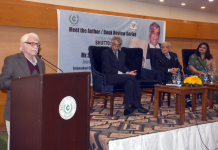The seeds of terrorism were sown in Pakistan long before the Afghan conflict and the war
against terror. Indecisiveness, uncertainty and procrastination by various governments
allowed terrorist and extremist agendas from across the border to take root and flourish in
different parts of the country, especially in Baluchistan, erstwhile FATA and Khyber
Pakhtunkhwa. Once the Pakistani state abrogated its role as a provider of justice and
security, the Taliban found their space and relevance and filled the vacuum that was
created. These were some of the recommendations that were put forward by speakers at
the Islamabad Policy Research Institute’s flagship series on Counter-Terrorism in
Pakistan. The first moot of this series ‘Counter-Terrorism Experience of Pakistan in
Kinetic Domain: Lessons Learnt and Way Forward’ analysed Pakistan’s domestic
counter-terrorism experience from a law enforcement lens. Practitioners and law
enforcement representatives; Former National Coordinator, National Counter Terrorism
Authority; Former Director General, Institute for Strategic Studies, Research & Analysis,
National Defence University; Former Additional Inspector General Police and senior
ISLAMABAD POLICY RESEARCH INSTITUTE
5
th Floor, Evacuee Trust Complex, Sir Aga Khan Road,
F-5/1, Islamabad, Pakistan
Tel: + 92 51 9211346-49; Fax + 92 51 9211350
Email: [email protected]
Website: www.ipripak.org
officials from the Intelligence Bureau and Frontier Constabulary provided brief historical
context of Pakistan’s efforts against terrorism and enlightened the audience on the
strategic and tactical steps taken by the country to deal with the threat of terrorism and
violent extremism. The participants described how Pakistan has transitioned from victims
of terrorism to victors against terrorism, emphasizing on how important kinetic measures
have been to defeat the menace and why is it important to formulate strategy to sustain
the success against militant groups. Our policy makers must evaluate whether it is the
right time to demilitarize the police force and call our armed forces back to the barracks.
It was pointed out that the average time for counter-terrorism operations is 22-23 years,
Sri Lanka took 27 years, but Pakistan achieved the impossible by doing so in 15 years.
Regarding Pakistan’s current state of challenges and options vis-à-vis emerging scenarios
post-kinetic operations, the speakers stressed the need for constant vigilance. It was
highlighted that intelligence gathering is and should be the first line of defense. CT
policies and strategies should not be developed in a vacuum. Rational, logical
understanding of the context and realities on the ground is very vital for policy-makers.
The speakers urged that civilian law enforcement agencies and training of police as first
responders should be a high priority, along with declaring an education emergency in the
country.
It was discussed that terrorism is a multilayered phenomenon, made more complex given
Pakistan’s diverse multi-ethnic and multi-cultural population. They lamented that there is
a deep disconnect between the state-society due to which extremist and anti-state
elements have been able to find relevance and space in the country.
Speakers outlined that intelligence gathering is not only done through technological
means but also human informants, though for the latter, public trust and confidence is
key. Citizen informants also need to be provided protection which is a weak area in
Pakistan’s counter-terrorism strategies. It was suggested that every district in Pakistan
should have its self-sufficient anti-terrorist unit.
Furthermore, the participants were of the view that as a nation, Pakistan is yet to come to
terms with the psychological impacts of the conflicts it has been involved in. The country
not only needs to fight religious terrorism but also the venom of ethnic and sectarian
conflicts. Every province has its own peculiar and unique set of problems and
idiosyncrasies, therefore, a one size fits all model cannot be applied on all regions. It was
stressed that while Pakistan does have economic issues, the media and citizens in general
need to become more cognizant of the impacts terrorism has had on the country. The
wide gap between strategists, the public and intelligentsia needs to be bridged. All
stakeholders need to work together to battle the spectre of terrorism and extremist
ideologies. While 9/11 was a terrible tragedy and had huge repercussions for Pakistan,
especially in terms of the refugee crisis and creation of IDPs, it forced the government to
fix the security landscape of the country. There is need for strong madrassah reforms and
to cleanse the educational curriculum of bias and racism.
One of the speakers opined that propaganda is the main ingredient of terrorism and
terrorist organizations. For counter-terrorism initiatives to work, leadership is very
important, apart from having the courage and will to lead from the front. The job of the
police is to fight crime, not tackle terrorism or insurgency, especially when they are
neither trained nor equipped to deal with either. It was highlighted that the various socalled peace agreements that were signed between the Taliban and different governments
over the years opened the eyes of the public to the real nefarious designs of the Taliban,
subsequently shifting sympathies towards the government, and the once nameless and
faceless agents of terror and fear could be given names and faces.
The speakers paid tribute to all the police officials, citizens and LEA personnel who had
lost their lives or the lives of their families to fight valiantly against terrorism to protect
Pakistan. The moot also included participants from Islamabad Policy Research Institute,
National Defense University and Centre for Strategic & Contemporary Research.=DNA
============
















